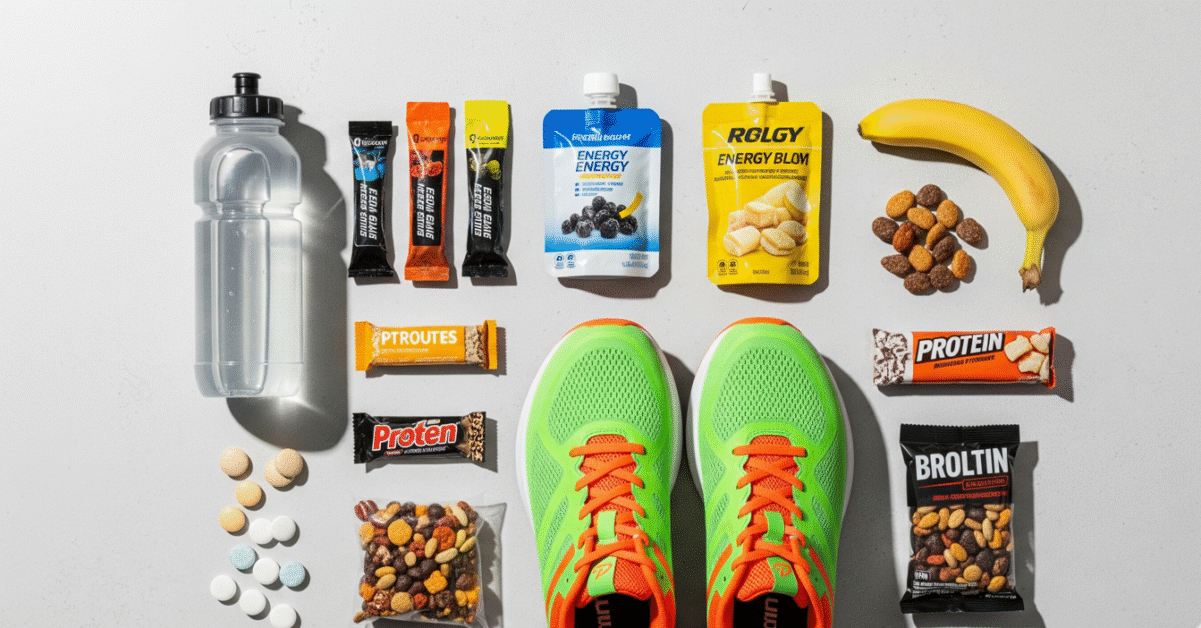Warning: Cannot modify header information - headers already sent in /home/u278635817/domains/mymorninglife.com/public_html/wp-content/plugins/artigosgpt/artigosgpt.php on line 29509
Warning: Cannot modify header information - headers already sent in /home/u278635817/domains/mymorninglife.com/public_html/wp-content/plugins/artigosgpt/artigosgpt.php on line 29509
Running nutrition plays a crucial role in unlocking your peak performance during morning runs. It’s not just about eating; it’s about fueling your body with the right nutrients to boost energy and accelerate recovery. Whether you’re a casual jogger or a seasoned athlete, understanding how to optimize your diet can transform your running experience and results.
With more people embracing early morning workouts, the demand for effective nutrition strategies tailored to this routine has skyrocketed. Running nutrition ensures your body has the energy to power through miles while minimizing fatigue and muscle soreness afterward. This guide dives into practical meal ideas and nutritional insights designed specifically for morning runners.
Discover how to balance macronutrients, time your meals, and choose energy-boosting foods that enhance endurance and speed up recovery. By the end, you’ll have actionable tips to elevate your morning runs with science-backed nutrition strategies.
Contents
ToggleUnderstanding the Basics of Running Nutrition
What Running Nutrition Means
Running nutrition involves consuming foods and fluids that support energy production, endurance, and recovery. It combines carbohydrates, proteins, fats, vitamins, and minerals tailored to the unique demands of running.
Proper nutrition helps maintain glycogen stores, repair muscle tissue, and regulate hydration—key for consistent performance during morning runs.
Why Timing Is Crucial
Eating at the right time before and after running optimizes energy availability and recovery. Morning runners often face challenges balancing fasted runs versus fueling beforehand.
Strategic timing ensures your body uses stored energy efficiently while replenishing nutrients to reduce fatigue and muscle damage.
Common Nutritional Challenges for Morning Runners
Early workouts limit time to digest heavy meals, increasing the risk of stomach discomfort or low energy. Additionally, dehydration overnight can impact performance.
Understanding how to manage these challenges with appropriate food choices and hydration can significantly improve your running experience.
Macronutrient Breakdown for Optimal Energy
Carbohydrates: The Primary Fuel
Carbohydrates are the main energy source during running, especially for high-intensity sessions. They replenish glycogen stores vital for sustained endurance.
Focus on complex carbs like oats and whole grains to maintain steady blood sugar levels throughout your run.
Proteins for Muscle Repair
Consuming protein supports muscle recovery and reduces soreness post-run. It’s essential for rebuilding tissues broken down during exercise.
Include high-quality protein sources such as eggs, Greek yogurt, or plant-based alternatives in your meals.
Healthy Fats: Sustained Energy
Fats provide long-lasting energy and support overall health. They’re especially helpful for longer, slower-paced runs.
Incorporate sources like avocados, nuts, and seeds to balance your nutrition without causing digestive distress.
Pre-Run Nutrition Strategies
Light and Energizing Meals
Avoid heavy or greasy foods before morning runs to prevent discomfort. Opt for easily digestible carbs paired with small protein amounts.
Examples include a banana with peanut butter or a slice of toast with honey, providing quick energy without weighing you down.
Hydrating Before You Hit the Road
Rehydrating after sleep is essential to maintain performance. Start with a glass of water or an electrolyte drink before running.
Proper hydration supports muscle function and prevents early fatigue, especially in warm climates or longer distances.
Timing Your Pre-Run Snack
Consume your pre-run meal 30 to 60 minutes before exercise to allow digestion without feeling sluggish.
Adjust timing based on your body’s response and the intensity of your run to find your personal sweet spot.
Post-Run Recovery Nutrition
Replenishing Glycogen Stores
After running, your muscles crave carbohydrates to restore depleted glycogen. Aim to eat within 30 minutes post-run for optimal absorption.
Good options include fruit smoothies, sweet potatoes, or whole-grain bread with nut butter.
Protein for Muscle Repair
Pair carbs with protein to accelerate muscle recovery and reduce soreness. The ideal ratio is about 3:1 carbs to protein.
Try a protein shake, cottage cheese with fruit, or boiled eggs with toast as quick and effective choices.
Rehydration and Electrolyte Balance
Replace fluids lost during your run with water and electrolyte-rich beverages. This prevents cramping and supports muscle function.
Coconut water and sports drinks with sodium and potassium are excellent options to restore balance.
Meal Ideas Tailored for Morning Runners
Quick and Nutritious Breakfasts
- Overnight oats with chia seeds, berries, and almond milk
- Whole-grain toast topped with avocado and a poached egg
- Greek yogurt parfait layered with granola and fresh fruit
Easy Pre-Run Snacks
- Banana with natural peanut butter
- Rice cake with honey and almond butter
- Small smoothie with spinach, banana, and protein powder
Simple Post-Run Meals
- Quinoa bowl with roasted vegetables and grilled chicken
- Whole-grain wrap filled with hummus, turkey, and fresh greens
- Scrambled eggs with sautéed spinach and a side of fruit
Hydration Tips for Morning Runners
Understanding Fluid Needs
Hydration influences energy levels, focus, and muscle performance. Morning runners should prioritize fluids to offset overnight dehydration.
Drink water consistently throughout the day and before runs to maintain optimal hydration status.
Incorporating Electrolytes
Electrolytes like sodium, potassium, and magnesium regulate muscle contractions and fluid balance. Deficiency can cause cramps and fatigue.
Consume electrolyte-rich foods and drinks, especially after intense or long-distance runs in hot weather.
Hydration Habits for Daily Routines
Develop a habit of drinking water upon waking and before your run. Small sips during your workout can help maintain hydration without discomfort.
Post-run, replenish fluids with water or sports drinks to accelerate recovery and prepare for your next session.
Supplements and Their Role in Running Nutrition
Popular Supplements for Energy and Recovery
BCAAs, caffeine, and beetroot juice are common supplements that can boost performance and reduce muscle fatigue.
Consult with a healthcare professional before adding supplements to ensure they fit your individual needs.
Vitamins and Minerals to Support Runners
Iron, vitamin D, and magnesium are vital for oxygen transport, bone health, and muscle function. Deficiencies can impair running performance.
Incorporate nutrient-rich foods or consider supplementation if recommended by a healthcare provider.
Natural Foods vs. Supplements
Whole foods should be the foundation of your running nutrition. Supplements can fill gaps but shouldn’t replace balanced meals.
Prioritize nutrient-dense foods to ensure you meet your energy and recovery needs naturally.
Creating a Running Nutrition Plan That Works
Assess Your Personal Needs
Consider your running intensity, duration, and goals when designing a nutrition plan. Tailor meals to suit your energy expenditure.
Track your responses to different foods and adjust accordingly for optimal performance.
Plan Meals and Snacks Strategically
Schedule your meals and snacks around your runs to maximize fuel availability and recovery.
Prepare simple, nutrient-rich options that fit your morning routine and digestion preferences.
Step-by-Step Morning Nutrition Routine
- Hydrate immediately after waking with a glass of water.
- Eat a light pre-run snack 30-60 minutes before your workout.
- Run your planned session with small water sips as needed.
- Consume a balanced post-run meal within 30 minutes.
- Rehydrate with electrolyte-rich fluids to restore balance.
- Adjust portions and timing based on energy levels and digestion.
| Meal Type | Recommended Foods | Key Nutrients | Timing |
|---|---|---|---|
| Pre-Run Snack | Banana, toast with honey, rice cake | Simple carbs, small protein | 30-60 mins before run |
| Post-Run Meal | Smoothie, quinoa bowl, eggs with spinach | Carbs, protein, electrolytes | Within 30 mins after run |
| Hydration | Water, coconut water, sports drink | Fluids, sodium, potassium | Before, during, and after run |
Conclusion
Running nutrition is a powerful tool that can transform your morning runs from ordinary to extraordinary. By understanding the balance of macronutrients, timing your meals, and prioritizing hydration, you create the foundation for sustained energy and faster recovery. Remember, your body is your greatest ally—nourish it thoughtfully to unlock your full running potential. The next time you lace up at dawn, let the power of nutrition propel you further and stronger.
FAQ
What should I eat before a morning run?
Before a morning run, choose a light snack rich in easily digestible carbohydrates with a bit of protein, such as a banana with peanut butter or toast with honey. Eat this 30 to 60 minutes prior to running to ensure quick energy without discomfort. Avoid heavy or fatty foods that may cause stomach upset during exercise.
How important is hydration for morning runners?
Hydration is crucial as your body loses fluids overnight and during exercise. Drinking water immediately after waking and before your run prevents dehydration, which can impair performance and cause fatigue. Post-run hydration with electrolytes helps restore balance, supports muscle function, and accelerates recovery.
Can I run on an empty stomach in the morning?
Running fasted is possible but may decrease energy levels for some runners, especially during longer or intense sessions. If you choose to run on an empty stomach, monitor how your body responds. For optimal performance and recovery, a small pre-run snack is generally recommended.
What are the best post-run foods for recovery?
After running, focus on foods combining carbohydrates and protein to replenish glycogen and repair muscles. Examples include smoothies with fruit and protein powder, eggs with whole-grain toast, or quinoa bowls with vegetables and lean protein. Aim to eat within 30 minutes of finishing your run for best results.
Are supplements necessary for morning runners?
Supplements like BCAAs, caffeine, or vitamins can support energy and recovery but aren’t essential for everyone. Whole foods should be the primary nutrition source. Consult a healthcare professional before adding supplements to your routine to ensure they suit your individual needs and don’t replace balanced meals.
More Articles




























